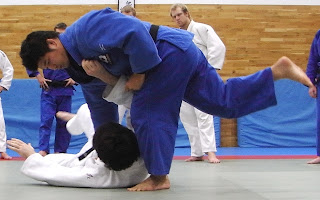
If you are a judo coach you have a very important role. If
you are paid as a judo coach, then you have a very important job.
Why is it an important job?
You have a responsibility to your judoka, the athletes that
trust you. The trust is often built on respect. Your judoka respect you, your
behaviours and your opinions. They value your knowledge, they learn through the
way that you communicate that knowledge.
When you share knowledge effectively, it can be utilised by
the judoka to win a match. The judoka understands that the win is because of
the knowledge that you shared with them. This reinforces their belief in you,
and the knowledge that you have, and your ability to communicate it effectively.
Sometimes your knowledge is found wanting. You are not
really sure how to deal with a certain opponent, or a certain kumi-kata
situation. You are embarrassed at your limited knowledge in a certain area. You
try to hide it. Maybe you convince yourself that you think you know the answer.
Your judoka trusts you. They try their best, but they don’t succeed. Your
limited knowledge let them down. There is a small chink in their respect for
you. They are not sure to fully believe you the next time. Gradually the
relationship breaks down. The trust and communication that you had together
starts to fall apart. Each thinks the other is to blame.
How can we avoid this? Certainly you cannot hope to win all
the matches, your relationship cannot be built on only winning.
If we think about a judo competition, in each round, half
the players win their matches, and half the players lose their matches. That’s
the sobering thing about judo. You either win or lose. If you keep a record of
the matches of all your judoka, if the win record is better than 50% you are
doing better than average.
If your judoka can see that you are constantly trying to
improve your knowledge, they will see that you are investing your time to help
them. They will see that you are studying for mutual welfare and benefit. They
will have greater confidence that the suggestions that you make are based on
reflection, on evidence, on research.
Research, evidence and reflection can help the judo coach to
make better decisions, to offer better advice, to have access to a wider range
of ideas. Study into communication methods and techniques can help the
decisions, advice and ideas be understood and applied more effectively and more
efficiently. Maximum efficiency with minimum effort.
Study hard, don’t expect it to be easy, and your players
will benefit. They may even win more matches. The harder you work, the luckier
they get.
Good luck to all your judoka.




No comments:
Post a Comment